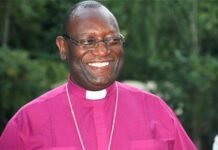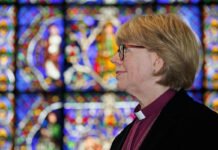Meeting in a hybrid platform, with most delegates physically gathered in diocesan venues and nationally inter-connected through zoom, the 11th Regular Synod of the Episcopal Church in the Philippines met on April 7 up to noontime of the next day, electing on first ballot the lone nominee for the next Prime Bishop. The Rt. Rev. Brent Harry W. Alawas, Bishop of Northern Philippines, will succeed The Most Rev. Joel A. Pachao who will retire in July 2021.
Prior to the Synod, eight 3-hour pre-Synod conferences were held in a similar platform since January to discuss proposed constitutional and canonical amendments, financial reports and budget for the next triennium, reports of dioceses, institutions, organizations and programs and proposed resolutions. Questions and answers, comments and suggestions were continuously made through social media, text messages and phone calls. The official reception of reports, approval of budget, proposed amendments and resolutions were finally done at the formal sessions of the Synod. Two Bible studies and liturgical celebrations also highlighted the national gathering.Consistent with its theme, “Recovering our Prophetic Ministry”, the Synod approved a resolution expressing opposition to the Anti-Terror Law and to consequent red-tagging. It also called for a more vigorous and compassionate approach to combat covid-19 and its variants. Meanwhile, taking action on the call of the Prime Bishop, the Visayas Mission Area will be elevated into a missionary diocese within the next triennium.
Other major accomplishment of the Synod was the approval of more than 50 proposed amendments to the Church’s constitution and canons. Some of these are seen as removing institutional obstacles that hinder a more vibrant and dynamic mission and ministry. This includes formal recognition of worshippers or those who are not baptized or received members but who are actively and regularly participating in worship and in the ministry of the Church and the grant of equal status and privileges to them. Also, a mission area can now be established by the national church even within the jurisdiction of existing dioceses if there is no on-going work or future plan by the diocese concerned. Finally, lay ministries have been expanded to recognize lay pastors, evangelists and preachers.



